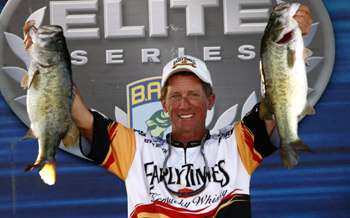
Kentucky Lake, one of the largest man-made lakes in the world, is home to the eighth Elite Series tournament of the 2008 season. Its 160,000 acres of water, and over 2,000 miles of shoreline, harbor an excellent population of largemouth, smallmouth and spotted bass.
Lake Barkley — considered by some to be the most underrated bass fishery in the nation — is also a part of this tournament. Connected to Kentucky Lake by a short canal, it affords anglers another 57,000 acres of prime black bass fishing.
"Both lakes are in great shape. The water's in the 84 to 85 degree range, it's up just a bit, and the color is darn near perfect for summer ledge fishing," say Kevin Wirth, Elite Series competitor, nine-time Bassmaster Classic qualifier and Western Kentucky native.
"I haven't caught a lot of quality fish in practice (he defines quality as 4 to 6 pounds) but I have been on some pretty good numbers. I think the size will get better as I refine my pattern."
Exactly what that pattern is Wirth won't say, but he does laughingly offer this meaningless hint.
"It's Tuesday night and I'm just pulling off the water. I have 12 rods on the deck of my boat, each rigged with a different lure. I caught a keeper bass on 11 of those outfits today. That's all I'm going to say about it."
Fortunately, he's more specific about the lakes in general. "The bass are in a true postspawn, early summer pattern. Anybody who knows anything about Kentucky Lake knows what that means — open water ledges.
"But, don't get too hung-up on Kentucky Lake. Barkley is good, too. There aren't as many bass over there, but the size is good, maybe even better. And, the ledges on Barkley are every bit as good as those on Kentucky Lake. Both lakes have hundreds of ledges in the 10 to 20 foot range that hold big schools of big bass at this time of year."
Wirth continues his analysis by saying that anglers "won't hurt themselves" regardless of where they fish in the lake they choose — near the dam, in the middle section or at the upper end. They all hold winning numbers of bass in his opinion.
Despite all the options that may be available, Wirth believes weights will be in the "solid" range this week. "I'd say it'll take around 26 pounds to make the Top 50 cut and maybe 50 pounds, or a little better, to make the Top 12 on Sunday. Included in those weights will be a big bass weighing 7 1/2 pounds.
"And I'd expect the winning weight to be at least 80 pounds. That may sound high, but remember that both lakes have solid populations of largemouth and smallmouth. I was fishing for largemouth today and caught a 4- and a 5-pound smallie in a 20-yard stretch of water. That kind of fishing can make for serious weight if one of the guys gets on a wad of them.
What about the spots?
"I didn't mention spots for a reason. They don't count for much here. I know you'll hear a lot about them, but don't let that fool you. A big spot on either one of these lakes is 3 pounds. No one will win with 3-pound bass. This'll be a largemouth tournament with some big smallies thrown in."
He's equally specific about who we should be watching as the tournament progresses.
"Kevin VanDam is definitely one to watch. I know everyone says that but remember this is a Tennessee River impoundment and he's death on water like we have here. And, with all the water that's available guys won't be stacked on top of each other. It could be lights out if he starts running the ledges.
"Mike McClelland is another one to watch. He's good with offshore ledges and open water stuff, and he's hot. That's a winning combination for him and could mean a whippin' for the rest of us.
"Jeff Kriet and Skeet Reese should be favorites, too. Kriet had a Top 12 finish here last year, and Reese is on a roll. He's been doing it quietly, but if you look at his Toyota Tundra Bassmaster Angler of the Year standings you'll see what I mean."
Wirth tempers all of his predictions, however, with one word: wind.
Kentucky Lake turns into a treacherous, impossible to fish body of water when a strong north or south wind sweeps across the water. It makes open water fishing hopeless and will force anglers to move into shallow, protected areas. It's anybody's tournament at that point.
The scheduling of competition makes this an even more ominous possibility. The launch is later than normal and so is the weigh-in. More hours under the sun means warmer air. Warmer air means more air movement. More air movement means more wind.
"Regardless of the weather or which lake the guy's fish or how they fish this is going to be one heck of a tournament. Tell the fans not to miss it."
